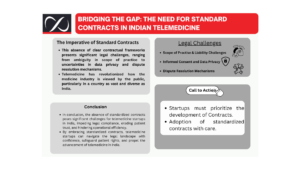
Telemedicine is seen as a solution to improve access to medical services in India. However, a critical gap exists: the absence of standardized contracts for doctor-patient interactions in telemedicine. This creates legal challenges, including uncertainty in practice scope and data privacy issues. This absence of clear contractual frameworks presents significant legal challenges, ranging from ambiguity in scope of practice to uncertainties in data privacy and dispute resolution mechanisms.
Telemedicine has revolutionized how the medicine industry is viewed by the public, particularly in a country as vast and diverse as India. With its potential to bridge geographical barriers and provide healthcare services to remote and underserved areas, telemedicine holds immense promise for improving healthcare accessibility and outcomes. Yet, the realization of this potential is hindered by the absence of standardized contracts, which serve as the bedrock of transparent and legally sound doctor-patient interactions.
The absence of standardized contracts creates a void that permeates every aspect of telemedicine practice in India. Without clear contractual agreements delineating the rights, responsibilities, and liabilities of both patients and healthcare providers, the telemedicine landscape becomes rife with uncertainties and legal ambiguities. This deficiency undermines the integrity and trust essential for the effective delivery of healthcare services, hindering the growth and scalability of telemedicine startups across the country.
Case Study: Scope of Practice and Liability Challenges
In a telemedicine startup operating in India, a patient sought a consultation for persistent headaches. During the teleconsultation, the healthcare provider, relying solely on the patient’s description of symptoms and limited visual examination, diagnosed the condition as a tension headache and prescribed over-the-counter pain medication. However, the patient’s symptoms worsened over the following days, leading to an emergency room visit where they were diagnosed with a severe sinus infection requiring antibiotic treatment. The patient, dissatisfied with the initial telemedicine consultation and treatment outcome, sought legal recourse, alleging misdiagnosis and negligence on the part of the healthcare provider.
The absence of standardized contracts exacerbated the ambiguity surrounding the scope of the doctor’s practice and their liability in teleconsultations. Without clear contractual frameworks outlining the extent of the doctor’s responsibilities and the associated risks, both parties found themselves vulnerable to disputes and legal complications. The lack of documentation detailing the responsibilities of the healthcare provider and the expectations of the patient made it challenging to determine the extent of liability and resolve the dispute effectively. This case underscores the critical need for standardized contracts in telemedicine to provide clarity on the scope of practice and establish clear parameters for doctor-patient interactions, thereby mitigating legal risks and fostering trust between all parties involved.
Case Study: Informed Consent and Data Privacy Challenges
In another scenario, a telemedicine startup in India faced a data privacy breach when patient medical records were inadvertently shared with unauthorized third parties due to a technical glitch in the telemedicine platform. Patients affected by the breach raised concerns about the unauthorized access to their sensitive medical information, leading to reputational damage for the startup and potential legal repercussions.
The absence of standardized contracts complicated the process of obtaining informed consent and safeguarding patient data privacy. Without clear contractual frameworks delineating the scope of consent regarding data collection, storage, and usage, telemedicine startups lacked explicit guidance on protecting patient data. The lack of comprehensive provisions regarding data privacy and informed consent heightened concerns about patient confidentiality and data security, ultimately resulting in a breach and subsequent legal challenges. This case highlights the importance of standardized contracts in telemedicine to establish clear guidelines for informed consent and data privacy, ensuring compliance with data protection laws and enhancing patient trust in the security of their medical information.
Case Study: Effective Dispute Resolution Mechanisms
In a telemedicine startup operating in India, a patient sought a consultation for ongoing back pain through the platform. Despite receiving treatment recommendations from the healthcare provider, the patient’s symptoms persisted, leading to dissatisfaction with the service provided. The patient initiated a formal complaint against the telemedicine startup, alleging inadequate care and seeking compensation for perceived damages.
Without clear contractual frameworks outlining dispute resolution mechanisms, the telemedicine startup faced challenges in addressing the patient’s complaint promptly and effectively. The absence of established procedures for handling disputes between patients and healthcare providers exacerbated the situation, leading to prolonged conflict and reputational damage for the startup.
This case underscores the importance of standardized contracts in telemedicine to incorporate clear and comprehensive provisions for dispute resolution. By establishing predetermined procedures and mechanisms for addressing conflicts, such as mediation, arbitration, or resorting to legal remedies, telemedicine startups can minimize the risk of prolonged legal disputes and uphold their commitment to delivering quality healthcare services. Standard contracts provide a framework for resolving disputes swiftly and efficiently, preserving the integrity and reputation of telemedicine services.
Analysis of the case studies:
Scope of Practise & Liability Challenges:
The absence of standardized contracts in Indian telemedicine exacerbates the ambiguity surrounding the scope of a doctor’s practice and their liability in teleconsultations. Without clear contractual frameworks, defining the extent of a doctor’s responsibilities becomes a gray area, leaving both parties vulnerable to disputes and legal complications, particularly in cases of misdiagnosis or treatment errors.
In practice, without standardized contracts, telemedicine startups and healthcare providers may lack clear guidelines on the services to be offered, the boundaries of medical advice provision, and the associated risks. This ambiguity opens the door to misunderstandings and disagreements between patients and healthcare providers, eroding trust and potentially leading to legal repercussions.
For instance, in a scenario where a telemedicine consultation results in a misdiagnosis due to inadequate information provided by the patient or insufficient examination by the healthcare provider, the absence of standardized contracts makes it challenging to determine the extent of liability. Without clear documentation outlining the responsibilities of both parties, resolving disputes arising from such incidents becomes a complex and contentious process.
Standard contracts play a pivotal role in addressing these challenges by providing clarity on the scope of a doctor’s practice and their liabilities in teleconsultations. By establishing clear parameters upfront, these contracts mitigate the risk of legal disputes and foster trust between patients and healthcare providers. Additionally, standardized contracts enable startups to navigate the complexities of telemedicine practice with confidence, ensuring accountability and transparency in doctor-patient interactions.
Informed Consent and Data Privacy:
Informed consent and data privacy are fundamental principles in healthcare, especially in the context of telemedicine where patient data is exchanged electronically. However, the absence of standardized contracts complicates the process of obtaining informed consent and safeguarding patient data privacy, leading to potential breaches and legal complications.
Without clear contractual frameworks, defining the scope of consent regarding data collection, storage, and usage becomes challenging for telemedicine startups and healthcare providers. Patients may not fully understand the implications of sharing their medical information electronically, while healthcare providers may lack explicit guidance on the appropriate use and protection of patient data.
In practice, this ambiguity raises concerns about patient confidentiality and data security, particularly in cases where sensitive medical information is transmitted over digital platforms. Without standardized contracts outlining comprehensive provisions regarding informed consent and data privacy, telemedicine startups risk running afoul of data protection laws and facing legal consequences.
Standard contracts address these concerns by incorporating clear and detailed provisions regarding informed consent and data privacy. These contracts specify the purposes for which patient data may be utilized, outline the measures implemented to safeguard confidentiality, and establish protocols for data storage and transmission. By ensuring compliance with data protection laws and instilling confidence in patients regarding the security of their medical information, standardized contracts mitigate the risk of legal complications and enhance patient trust in telemedicine services.
Dispute Resolution Mechanisms:
Effective dispute resolution mechanisms are essential for resolving conflicts arising from teleconsultations promptly and efficiently. However, the absence of standardized contracts complicates the process of resolving disputes, potentially leading to protracted legal battles and reputational damage for telemedicine startups and healthcare providers.
Without clear contractual frameworks, startups may lack established procedures and mechanisms for addressing conflicts between patients and healthcare providers. Disputes may escalate, leading to costly litigation and damaging the reputation of the parties involved.
Standard contracts alleviate these challenges by incorporating clear and comprehensive provisions for dispute resolution. These contracts outline the procedures and mechanisms for addressing conflicts, such as mediation, arbitration, or resorting to legal remedies. By establishing these mechanisms proactively, telemedicine startups can minimize the risk of prolonged legal disputes and uphold their commitment to delivering quality healthcare services.
In practice, standardized contracts provide a framework for resolving disputes swiftly and efficiently, preserving the integrity and reputation of telemedicine services. By establishing clear guidelines for conflict resolution, these contracts mitigate the risk of legal complications and foster trust between patients and healthcare providers.
Conclusion:
In conclusion, the absence of standardized contracts poses significant challenges for telemedicine startups in India, impeding legal compliance, eroding patient trust, and hindering operational efficiency. To thrive in this dynamic landscape, startups must prioritize the development and adoption of standardized contracts tailored to the unique nuances of telemedicine.
These contracts serve as the cornerstone of transparent, ethical, and legally sound doctor-patient interactions, laying the foundation for sustainable growth and innovation in the telemedicine sector. Failure to bridge this gap exposes startups to legal risks and undermines the broader goals of telemedicine adoption in India.
Therefore, addressing this critical need through standardized contracts is not merely a necessity but a strategic imperative for the success and viability of healthcare startups in the digital age. By embracing standardized contracts, telemedicine startups can navigate the legal landscape with confidence, safeguard patient rights, and propel the advancement of telemedicine in India.









